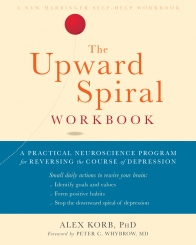 by Alex Korb
by Alex Korb
Positive life changes lead to positive brain changes. Drawing on the huge success of his groundbreaking book, The Upward Spiral, neuroscientist Alex Korb offers actionable, step-by-step skills to help you reshape your brain and create an upward spiral towards a happier, healthier life.
Full Description:
Positive life changes lead to positive brain changes. Drawing on the huge success of his groundbreaking book, The Upward Spiral, neuroscientist Alex Korb offers actionable, step-by-step skills to help you reshape your brain and create an upward spiral towards a happier, healthier life.
Depression is defined by a collection of symptoms. You feel crappy most of the time. Nothing seems interesting, and everything seems overwhelming. You have trouble with sleep. You feel guilty and anxious and have thoughts that life isn’t worth living. Each symptom reinforces and inspires new symptoms, and this is a sign that your brain circuits are caught in the downward spiral of depression. So, how can you reverse it?
In his first book, The Upward Spiral, neuroscientist Alex Korb demystified the intricate brain processes that cause depression and outlined a practical and effective approach for getting better. Based on the latest research, this evidence-based workbook takes the theory behind Korb’s breakthrough book and distills it into concrete, actionable exercises and skills.
Just as one small trigger can drag you down, an effective intervention can start enough momentum to carry you back up. Exercise, attention to breathing, gratitude, sleep hygiene, and positive social interactions are just some of the offerings in this workbook that can help alter activity in specific neural circuits, setting you on the path toward an upward spiral to happiness and well-being.
Note: In certain copies of this book, the tables for the PHQ-9 and GAD-7 have scoring of 1 ("Not at all") to 4 ("Nearly every day"); this scoring should in fact be 0 ("Not at all") to 3 ("Nearly every day") in order to yield an accurate rating of depression or anxiety. We regret the error.
Pages: 232
|